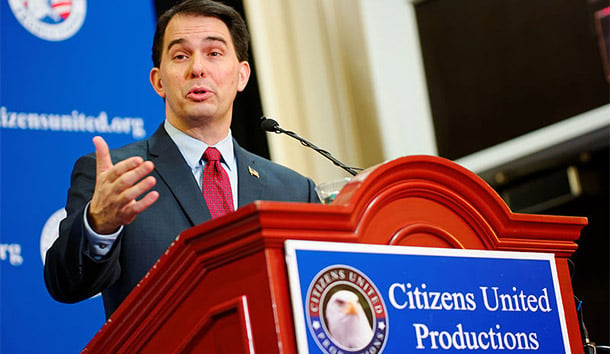In the life of politicians, single moments stand out when a decision to act or not to act defines their character and shapes their future success. Calvin Coolidge’s stand against the Boston police strike of 1919 and Ronald Reagan’s firing in 1981 of striking air-traffic controllers defined who they were. Gov. Scott Walker’s stand in 2011 against public-employee unions in Wisconsin defined him in the same way. That is why the Wisconsin governor’s presidential ambitions resonate with Republican primary voters.
After eight years of slow economic growth, foreign-policy disasters, and expansion of the powers of the federal government, preceded by eight years of wholesale retreat from limited-government principles by George W. Bush, grassroots voters desperately want this cycle stopped.
Is Scott Walker their savior, or just another “Dubya”?
On March 6, the Washington Post’s Philip Rucker and Robert Costa reported that the Wisconsin governor is being brought up to speed on foreign policy at a briefing organized by the American Enterprise Institute. AEI, a Washington think tank that has become the home of neoconservatives, has undertaken the education of Governor Walker.
Neoconservative political operative Elliott Abrams, son-in-law of former Commentary editor Norman Podhoretz and New York neocon Midge Decter, briefed the governor. The Post’s report indicates that Walker has also consulted former Secretary of State George Shultz, a holdover from the Nixon administration who moderated the foreign policy of the Reagan administration, and that Walker was meeting with AEI personnel for more “training” over the weekend of March 7.
Governor Walker is probably more aware of the road he is taking than the Post article implies, since last year he sought out Marc A. Thiessen, a speechwriter for former Secretary of Defense Donald Rumsfeld and President George W. Bush, to write Unintimidated: A Governor’s Story and a Nation’s Challenge. Published by Sentinel, a neoconservative publishing house founded by Adrian Zackheim, Walker’s book fits in with those of other Sentinel authors, including Bret Stephens’ America in Retreat, which advocates a return to the imperial foreign policy of the late Bush administration.
Walker also published an essay in National Review, “Standing With Our Friends, Standing Up to Our Enemies,” in which he advocates working with Israel to create a “bulwark capable of resisting Iranian aggression.”
Clearly, Walker’s submission to AEI’s imperial warriors indicates he is aware that AEI means Big Money. It is less clear that he understands the difference between realism and idealism in foreign policy. This is a critical flaw: AEI, members of the former Bush administration’s foreign-policy team, and moderates from the Reagan administration are not representative of where the Republican primary voter is today.
Like most American politicians, Walker has mastered domestic-policy issues, but knows little to nothing about national security and diplomatic history.
Where are the realists in the GOP? Why aren’t they pressing Walker, Gov. Rick Perry, Sen. Marco Rubio, and other aspiring candidates to advocate a sound foreign policy? What can be done to warn them of the dangers they face, should they accept guidance from neocon policy wonks?
If Governor Walker becomes an advocate for the latest form of Wilsonian idealism, he will have thrown away the advantage that his successful career in Wisconsin has created to become another “me too” candidate. Expand NATO? “Me too.” Boots on the ground in Iraq? “Me too.” Offensive weapons for Ukraine? “Me too.” Attack Iran? “Me too.” Syria? “Me too.”
Of course, if he decides not to join the chorus calling for another series of wars, his opponents will demand that the United States stand proudly with Ukraine, though it means putting American soldiers in the face of swarms of Russian troops. Other candidates—Jeb Bush, Rick Perry, Rick Santorum, Ted Cruz—will complain that Walker is not idealistic enough to lead America.
The media will also attack Walker in every possible way—from the left at the New York Times and the Washington Post, and from the right at National Review, the Wall Street Journal, and FOX News. Walker could easily point out to his supporters that wars sell newspapers and magazines, but American boys pay for those sales in blood.
If Gov. Scott Walker can bring himself to disdain the big bucks that have lured him into the precincts of the war faction at AEI, it may cost him this bid for the White House, but he will not have lost in the long term. He will have gained time to become a serious student of foreign policy, national strategy, and diplomatic history. While he is boning up, the failures of Barack Obama’s successor (Hillary or Jeb) may drive the American people to a Walker ticket in 2020.
[Image Credit: By Michael Vadon (Own work) [CC BY-SA 4.0 (http://creativecommons.org/licenses/by-sa/4.0)], via Wikimedia Commons]

Leave a Reply